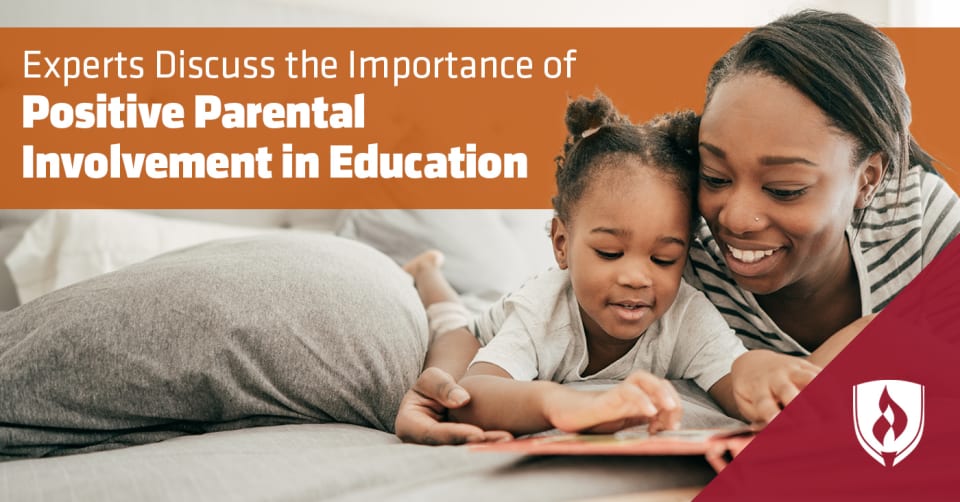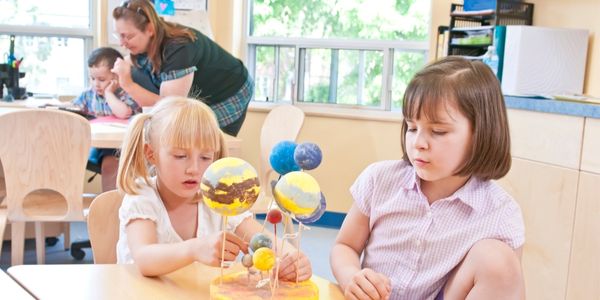Experts Discuss the Importance of Positive Parental Involvement in Education
By Ashley Brooks on 11/18/2019

Parents are responsible for every detail of their young children’s lives, from potty training to eating fruits and veggies. When kids finally board the school bus for the first time, most moms and dads breathe a sigh of relief. Finally, you can hand off some of that pressure to someone else, knowing that a qualified teacher will make sure your child receives the education they need!
But the role of parents in education involves more than just getting your kids safely to and from the bus stop. Research shows that parental involvement in education leads to greater student success and increased confidence, according to the National PTA.1
The National PTA also shares that “family involvement improves student success, regardless of race/ethnicity, class or parents’ level of education.”1
But what does parental involvement in schools look like? How can parents who are already juggling so many responsibilities find the time to invest in their kids’ education?
We spoke with early childhood education experts to get to the bottom of these questions and more. Their advice will prepare teachers and parents to work together for the good of all children’s education.
The importance of parental involvement in education
Many parents mistakenly believe that their children’s education is entirely in the hands of teachers, but research solidly supports the case for parental involvement.
Research from the National Coalition for Parent Involvement in Education shares that “no matter their income or background, students with involved parents are more likely to have higher grades and test scores, attend school regularly, have better social skills, show improved behavior and adapt well to school.”
The National PTA reports that “the most accurate predictors of student achievement in school are not family income or social status, but the extent to which the family . . . becomes involved in the child’s education at school.” It’s undeniable that parents who are active supporters of their children’s learning are giving their kids the best opportunity for educational success.
Parental support and involvement can also benefit kids of all ages at a developmental level that extends beyond academics. “When a child can see that their parent(s) is supporting them, they are more likely to take risks and learn something new instead of staying inside the box,” says Ria Simon, early childhood educator and junior account specialist at HiMama.
Practical ways for parents to expand their role in schools
Parents who take an active role in their children’s education are offering the support their kids need to see success at school. But determining how to get involved can be tricky, especially for parents who are also juggling a full-time job.
Our experts recommend these simple ways for parents to expand their role in their kids’ education.
1. Be present at school when possible
Parents who make an effort to be present around their children’s school are showing their kids that they care about their education—and that it’s important enough to deserve their attention. This doesn’t mean busy parents have to sacrifice all their free time to volunteer at school! Classrooms have many opportunities to get involved, so parents can choose the ones that work best with their schedules.
“Attend parent nights, conferences and open houses; chaperone field trips; volunteer in the classroom; or donate your time at home with materials and sending in needed supplies,” suggests Mary O’Keefe, a veteran pre-k teacher at Hudson Falls Central School District.
2. Show interest in kids’ schoolwork
Parents who are genuinely interested in their kids’ education are in a good position to provide support or find outside help if they notice a child is struggling. They also build connections with their children as they share excitement over their successes and help them work through disappointments.
O’Keefe suggests going beyond asking, “How was your day?”, and focusing on more specific questions like, “What do you like and dislike about school?” or “What subjects are easy or hard?” She also shares that reading together and displaying children’s work at home are ways parents can communicate that they care about what their kids are learning in the classroom. Showing that you care about what they’re learning helps reinforce the importance of it.
3. Keep a positive attitude towards education
Parents might think that cracking down is the right way to handle kids who say they dislike school or don’t want to do their homework. However, parents who keep a positive attitude about education are more likely to pass that sunny outlook onto their kids.
“Make any school involvement positive,” says Simon. “An example of this is sitting with them while doing homework/worksheets or showing them it is okay to fail and what to do when that happens.” And most importantly, “Always support them, no matter the outcome.”
Young children, in particular, are still forming their thoughts and feelings toward school—so do what you can to reinforce the positive and build them up as they work through any struggles.
How to recognize and avoid negative involvement
Of course, not all parental involvement is positive. We’ve all heard stories of overeager “helicopter parents” whose hovering actually harms their children’s ability to learn and grow.
“Parent contact is important, but constantly contacting your child's teacher for every little thing can make your child feel as though they can't handle a problem at school,” O’Keefe says.
She adds that this type of over involvement can pass a parent’s worries along to their child. “Children do need to feel that school is a good place to be and a safe place. If a parent seems nervous about school, your child will feel nervous,” O’Keefe says.
Education expert Chris Drew agrees that excessive worry can hamper students’ ability to learn. “Challenges are great for children’s development. By contrast, constantly worrying about a child and holding them back is only going to rub off on the child and will harm their confidence in the long run.”
O’Keefe advises parents of little ones to watch for signs that their kids no longer want to do things for themselves, like dressing themselves or packing their own backpack. “That may be a good time for parents to take a step back and re-evaluate their involvement,” she says.
Parental involvement for children’s success
Parents have a lot to worry about when it comes to raising young children, but determining how to support their kids’ education shouldn’t be one of them. Thanks to these expert tips, parents and teachers can work together to create positive parental involvement in schools!
Screen time is another top concern for parents. Learn how to navigate the tricky territory of screens and kids with our article, “Screen Time Recommendations: ECE Experts Shed Light on the Pros and Cons of Screen Time for Kids.”
1National PTA, Report: The Positive Relationship Between Family Involvement and Student Success, [accessed October, 2019] https://www.pta.org/home/run-your-pta/National-Standards-for-Family-School-Partnerships/Report-The-Positive-Relationship-Between-Family-Involvement-and-Student-Success
Graduates of Early Childhood Education programs at Rasmussen University are not eligible for licensure as a teacher in an elementary or secondary school. A Bachelor’s degree and a state teaching license are typically required to work as a teacher in a public school and some private school settings. States, municipalities, districts or individual schools may have more stringent licensing requirements. Students must determine the licensure requirements in the state and school in which they intend to work.
Childcare facilities and the states in which they are located establish qualifications for staff who work with children, and often implement guidelines regarding age, education, experience and professional development. Students must determine the licensure requirements for the state and facilities in which they work.
This program has not been approved by any state professional licensing body, and this program is not intended to lead to any state-issued professional license. For further information on professional licensing requirements, please contact the appropriate board or agency in your state of residence.




